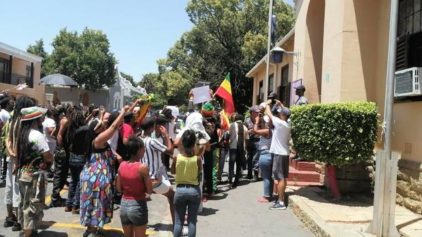
President Jacob Zuma
South Africans from all walks of life commemorated the Sharpeville Massacre on Monday, with politicians using the day to encourage national unity, while President Jacob Zuma complained about “racist” cartoonists.
Zuma spent the day in Durban where he told the thousands gathered at the Moses Mabhida Stadium to unite against racism. This year’s theme was South Africans United Against Racism following the recent racial incidents in the country.
Zuma warned against racists, such as cartoonists, who used art as a form of expression.
“We should thus be alert to subtle and disguised racism perpetuated through the stereotyping of individuals or groups of people in the media, through cartoons and satire.
“Earlier this year, our country experienced explosions of anger due to racist utterances and writings which reminded South Africans that the vestiges of white supremacy and racism still exist in some sections of society,” he said.
While Zuma called for unity, the DA’s Athol Trollip said human rights were under attack. He said freedom was more than the ability to vote.
“Real freedom is being given the opportunity to turn dreams into realities, no matter who you are, what you do or where you come from. We have a long way to go in achieving this type of reconciliation and equality; racism is sadly still part of our daily lives and we all have a responsibility to root it out,” said Trollip.
His message was echoed by the party’s Mpumalanga leader, James Masango, who spent his day in Nhlazatshe in Albert Luthuli Municipality, where he told those in attendance that as the country commemorated the day, thousands of people in Mpumalanga still lived in squalor.
He blamed the situation on the ruling party.
“You, here in Albert Luthuli Municipality, have to make do with dirty tap water you consume daily, the high rate of unemployment, children becoming orphans because some of their parents lost their lives to HIV/AIDS, and access to proper health care is inadequate,” he said.
The EFF reminded the country about the history of slavery and said South Africa still suffered anti-Black racism because of the legacies of slavery, colonialism and apartheid.
Spokesperson Mbuyiseni Ndlozi said those histories ensured that generation after generation, Black people were reproduced as inferior, cheap and disposable people who lived for the advancement of white people.
“Until there is land restoration and a process which reorganizes Black people’s settlements in terms of housing, sanitation and access to basic services like electricity and water; until Black people can get access to quality education up to university level and have access to decent capital to engage in the development of new industries which produce for people and not for profit; until such a time all these are realized, the humanity of Black people will remain obscure to the white world,” he said.
He called for the expropriation of land without compensation for equal redistribution.
Read more at www.news24.com


